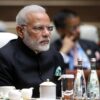
Media speculation that India’s Prime Minister Narendra Modi may not attend the Johannesburg summit and that the nation isn’t receptive to BRICS expansion may be signs a threatened West looks to ‘divide and rule’, writes M.K. Bhadrakumar.

Presented by Alison Broinowski for the 2023 IPAN ‘Peacewave’ conference. With former Foreign Minister Bob Carr, Senator David Shoebridge, Senator Jordan Steele-John, Mary Kostakidis, Colonel Lawrence Wilkerson, David Bradbury, Kellie Tranter, Brian Toohey, Michelle Fahy, Vince Scappatura, Michael West, Dr…